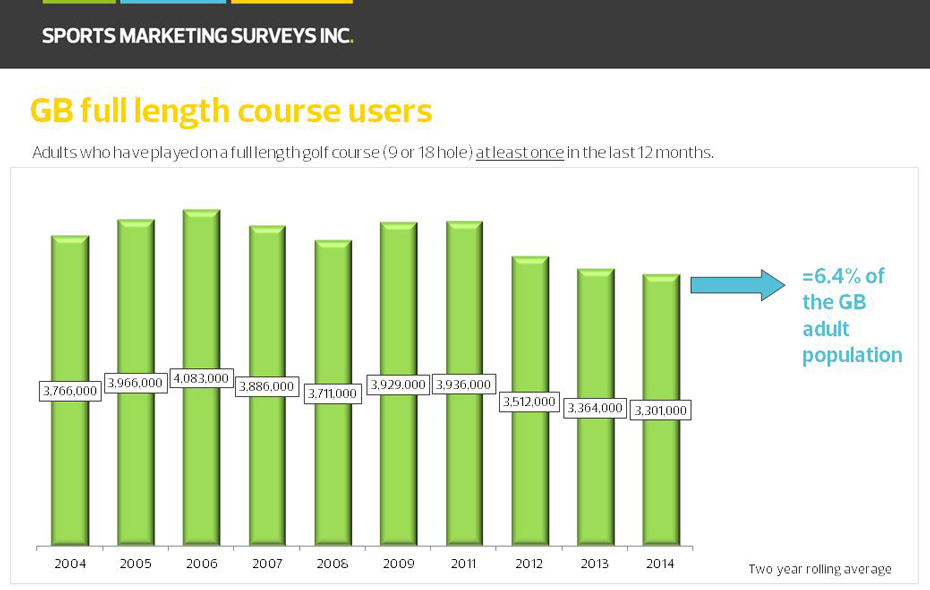UK golf participation figures stabilise
SMS Inc. annual investigation suggests UK golf participation rates have stabilised


Subscribe to the Golf Monthly newsletter to stay up to date with all the latest tour news, equipment news, reviews, head-to-heads and buyer’s guides from our team of experienced experts.
You are now subscribed
Your newsletter sign-up was successful
Want to add more newsletters?

Delivered daily
Daily Newsletter
Sign up for all the latest tour news, gear reviews, head-to-heads and buyer’s guides plus features, tips from our top 50 coaches and rules advice from our expert team.

Once a week
Kick Point
Sign up to our free Kick Point newsletter, filled with the latest gear reviews and expert advice as well as the best deals we spot each week.

Once a week
Women's Golf Edit
Sign up to our free newsletter, filled with news, features, tips and best buys surrounding the world of women’s golf. If you’re a female golfer, you won’t want to miss out!
Sports research company Sports Marketing Surveys Inc. has revealed the results of their annual investigation into the playing habits of the British Golfer. The figures show participation rates have stabilised.
Sports research company Sports Marketing Surveys Inc. (SMS Inc.) has revealed the results of their annual investigation into the playing habits of the British Golfer. The figures show participation rates have stabilised.
Golf participation in the UK finally stabilised in 2014, just above the 3.3 million mark, offering hope to the golf industry after a decade of decay. This succeeds news that 2014 saw an increase in the number of rounds played by 3.5% compared to 2013.
SMS Inc. puts the encouraging figures partially down to a warm and dry summer, without any major UK based major sporting events. A local and victorious Ryder Cup in Scotland – with good weather around it.
Although golf participation remains at its lowest level for over a decade, SMS Inc.’s study shows clear progression and opportunities for the sport to grow. For the second consecutive year female participation has risen, as has the number of ‘avid’ golfers (who play at least once a week on average).
As per the 2013 statistics, a cause for concern is the number of ‘infrequent’ golfers, who play less than 12 times a year, which is at its lowest on record in this millennium (1,786,000). Time is a major factor influencing player numbers, and may be the significant reason behind the decline in infrequent golfers.
Richard Payne, Senior Manager of Sports Accounts at SMS Inc. commented, “Whilst the 2014 figures give the golf industry reason to be more positive, the continued decline of infrequent golfers remains a challenge that needs to be overcome. SMS Inc. has continuously stressed the importance of the ‘three F’s’ – Fun, Flexible, and Family’, a vision which the industry must fully adopt following these latest figures, to convert both first-time triallists and new golfers who may be using driving ranges into full-length course users, and secondly to prevent the loss of more infrequent players.”
Subscribe to the Golf Monthly newsletter to stay up to date with all the latest tour news, equipment news, reviews, head-to-heads and buyer’s guides from our team of experienced experts.

Fergus is Golf Monthly's resident expert on the history of the game and has written extensively on that subject. He has also worked with Golf Monthly to produce a podcast series. Called 18 Majors: The Golf History Show it offers new and in-depth perspectives on some of the most important moments in golf's long history. You can find all the details about it here.
He is a golf obsessive and 1-handicapper. Growing up in the North East of Scotland, golf runs through his veins and his passion for the sport was bolstered during his time at St Andrews university studying history. He went on to earn a post graduate diploma from the London School of Journalism. Fergus has worked for Golf Monthly since 2004 and has written two books on the game; "Great Golf Debates" together with Jezz Ellwood of Golf Monthly and the history section of "The Ultimate Golf Book" together with Neil Tappin , also of Golf Monthly.
Fergus once shanked a ball from just over Granny Clark's Wynd on the 18th of the Old Course that struck the St Andrews Golf Club and rebounded into the Valley of Sin, from where he saved par. Who says there's no golfing god?